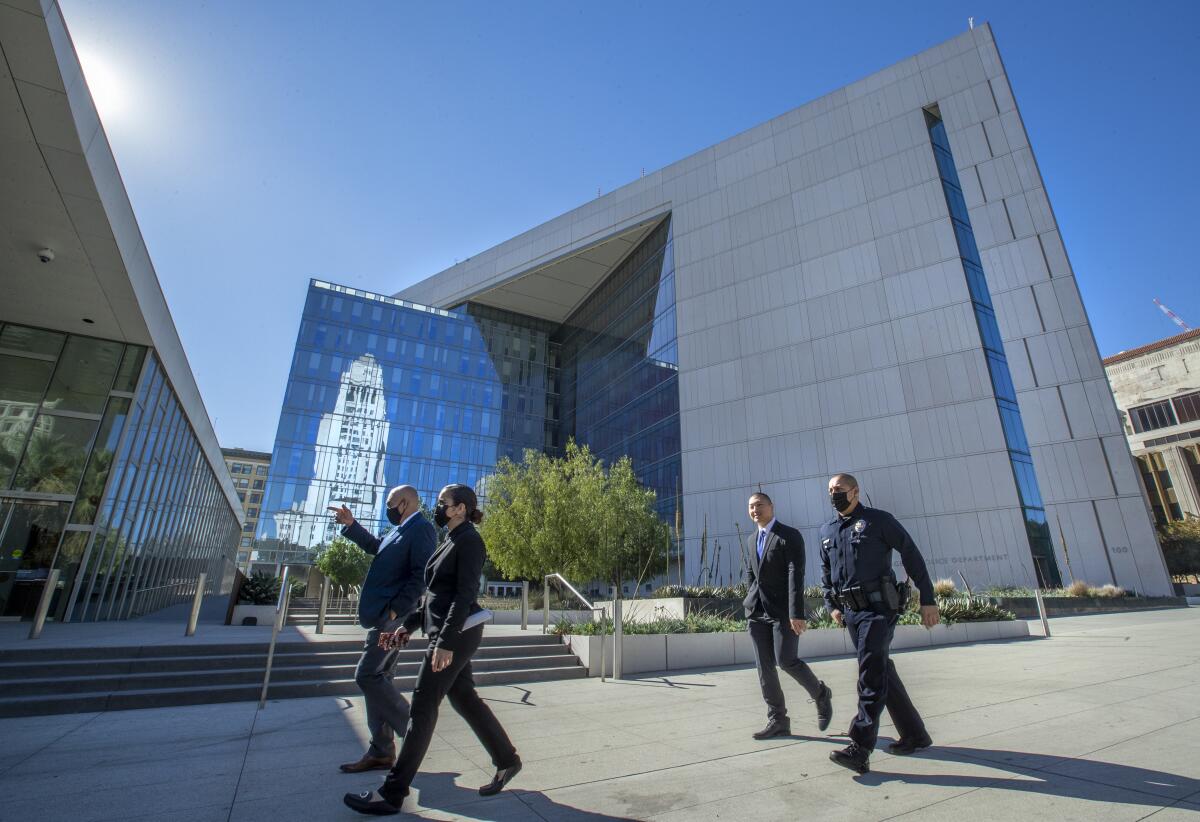LAPD panel approves new oversight of facial recognition, rejects calls to end program

- Share via
The Los Angeles Police Commission approved a policy Tuesday that set new parameters on the LAPD’s use of facial recognition technology, but stopped far short of the outright ban sought by many city activists.
The move followed promises by the commission to review the Los Angeles Police Department’s use of photo-comparison software in September, after The Times reported that officers had used the technology — contrary to department claims — more than 30,000 times since 2009.
The new policy restricts LAPD detectives and other trained officers to using a single software platform operated by the Los Angeles County Sheriff’s Department, which only uses mugshots and is far less expansive than some third-party search platforms. It also mandates new measures for tracking the Police Department’s use of the county system and its outcomes in the crime fight.
Commissioners and top police executives praised the policy as a step in the right direction, saying it struck the right balance between protecting people’s civil liberties and giving cops the tools they need to solve and reduce crime — which is on the rise. They called on the LAPD’s inspector general to assess the program’s “efficacy” moving forward and promised to revisit the policy if such reviews showed that it is flawed or ineffective.
“If the data proves to us that this system is not being used for the results that we intend, then we obviously have to revisit this policy,” commission President Eileen Decker said.
Activists said commissioners already have plenty of data showing that facial recognition software is flawed and can lead to unjust outcomes, particularly for Black and brown citizens. They noted that the vast majority of respondents to a recent call for public comment on the matter told the commission that they wanted the technology banned, not just limited. And they pointed to other jurisdictions and businesses that have banned such software or put a moratorium on its use in recent years, suggesting the commission was bucking a trend being set by more conscientious law enforcement overseers.
“They completely abdicated their responsibility as a civilian oversight body,” said Hamid Khan, with the Stop LAPD Spying Coalition — a group that has long battled the department’s use of surveillance technologies and has specifically targeted its use of facial recognition.
Khan said facial recognition is “flawed by design,” and that the commission’s vote to uphold the LAPD’s use of it was “business as usual, where the commission just buckled and gave the LAPD what they wanted.”
“It’s more license to racially profile, it’s more license to criminalize Black and brown folks,” Khan said.
Of 943 emails received by the commission in its request for public comments, the vast majority — 931 — opposed the policy, and just 12 approved of it, according to department records. Nearly 890 of the emails used similar language to a letter put forward by a coalition of groups, including Khan’s and Black Lives Matter-Los Angeles, which called for the technology to be banned and for the department’s past use of it to be investigated.
Commissioners said they read those emails and understood the concerns, but felt the new policy addressed many of the more specific concerns.
Lizabeth Rhodes, director of the LAPD’s Office of Constitutional Policing and Policy, agreed.
Rhodes noted the policy limits use of the county system to cases in which trained officers are trying to solve a crime, where there is an imminent threat to life, or when they are trying to identify someone who is incapacitated or at risk.
It explicitly states that a likeness in images identified by the software could be used as a lead by officers, but does not constitute probable cause for an arrest and cannot serve as the sole basis for criminal charges. “More is needed to have anything go forward,” Rhodes said.
In line with recently passed state legislation, the policy bans the use of such technology on images captured by officers’ body cameras or by dashboard cameras in officers’ cars. It also installs oversight and auditing mechanisms, so the department can better assess the technology’s usefulness.
Police Chief Michel Moore said he understands the need to use facial recognition somewhat sparingly, but also sees its value as a crime-fighting tool — citing one case in which it helped detectives identify a recent homicide suspect.
“In the absence of that information, I worry that that offender would still be out and would still be preying on others,” Moore said.
Commissioner William Briggs, elevated to vice president of the commission by his colleagues Tuesday, said he was satisfied that “there are protections in place to prevent this type of wholesale violation of civil rights” envisioned by the critics.
More to Read
Sign up for Essential California
The most important California stories and recommendations in your inbox every morning.
You may occasionally receive promotional content from the Los Angeles Times.














